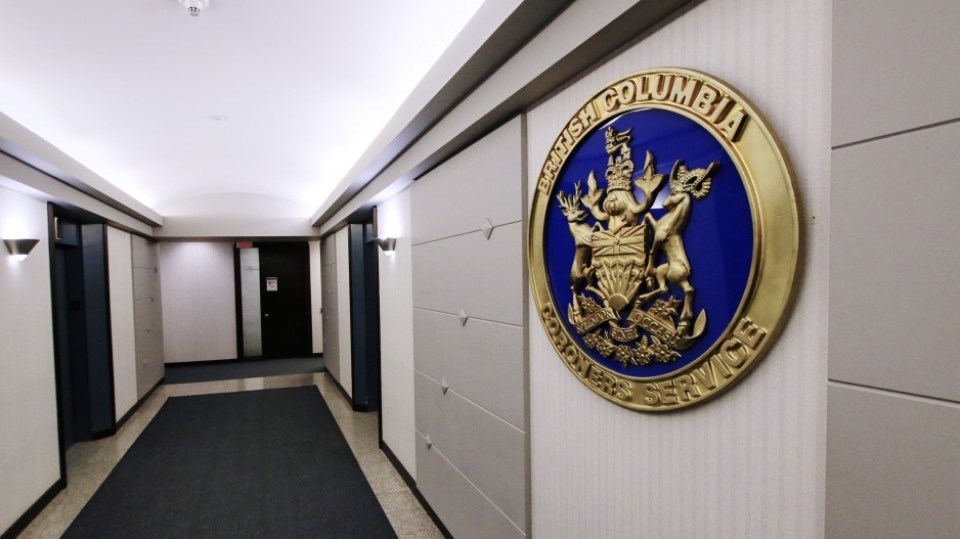The coroner presiding over the inquest of Vancouver Police Const. Nicole Chan’s 2019 suicide adjourned the hearing Tuesday afternoon, telling the jury to avoid finding fault and to seek unanimity in whatever it decides.
Susan Barth spent almost 15 minutes instructing the five jurors, who face a task more complicated than jurors do in criminal trials.
“You must not make any findings of legal responsibility nor express any conclusions of law,” Barth said in Burnaby coroner’s court. “Your findings must not blame or vindicate any person or agency. At times when the evidence conflicts you may have to determine which evidence to rely on. In doing so you should consider the reliability and the weight that you will give to particular evidence.”
Barth told the jurors they are not required to make recommendations, which are intended to prevent a similar tragedy, but to carefully consider the wording of any recommendations they may make, so as to ensure they are reasonable, achievable and practical.
“A few meaningful recommendations focused on addressing broader failures of systems and standards can be much more effective than a number of recommendations addressing unique circumstances,” Barth said.
She told them to direct recommendations to the appropriate agency or organization and that the verdict and recommendations would be forwarded to the chief coroner of B.C., Lisa Lapointe, who may bring them to the attention of the appropriate people, agencies and ministries of government. She reminded jurors to stay true to their oath, consult one another, rely only on evidence they heard in court and shut out any outside influence or prejudices.
“If you believe a recommendation is warranted, I suggest that you consider the goal to be achieved and recommend that the agency develop a plan to achieve it. There may be a variety of ways that the agency could achieve that goal using their expertise.”
Barth said the jury must come to a conclusion on the medical cause of 30-year-old Chan’s death and officially classify her death under one of five categories: natural, accidental, suicide, homicide or undetermined.
“To classify a death as a suicide, there must be clear, convincing and logical evidence that establishes on a balance of probabilities that at the time of the self-inflicted injury, the person intended to die, and that the person understood the consequences of their actions.”
The inquest began Jan. 23 and the jury heard overwhelming evidence that Chan died by hanging. The jury also heard testimony that Chan, who joined the Vancouver Police Department (VPD) in 2009, had pondered suicide since she was a 12-year-old and tried to end her life in 2012 and 2016.
In January 2019, Chan had been suffering depression and anxiety after complaining in 2017 to Chief Adam Palmer that two superiors in the VPD’s human resources office had coerced her into sexual relationships. One of them had blackmailed her and she feared he would not face consequences. Meanwhile, Chan also felt her policing career was over and reputation ruined by workplace gossip.
On the last night of her life, Gifford took away a knife, scissors and dog leash that Chan threatened to use to harm herself. Police officers responded to Chan’s apartment and an ambulance whisked her to Vancouver general Hospital, but a psychiatrist refused to admit her under the Mental Health Act. A VPD officer who drove Chan home said she promised not to harm herself. She was found dead the next morning with a note nearby.
Barth recounted basic facts provided in testimony by one of the VPD’s human resources officers, Chan’s boyfriend and his friend, and a police officer who mentored Chan and became her friend.
“Evidence was given by Supt. Shelley Horne, referring to when she and Insp. Novi Jette, dropped Ms. Chan off at her residence on Jan. 26, 2019, after she was seen at the [Vancouver General Hospital access and assessment centre]. They received a text from Miss Chan at 23:56 hours, or otherwise four minutes before midnight, notifying them that she was safely in her apartment.
“You heard evidence from [boyfriend] Jamie Gifford that he was home when Ms. Chan arrived, and that they had a brief conversation before he left for the night,” Barth said. “You also heard from [Sgt.] Corey Bech that he and Nicole spoke on the phone that night once she arrived home.
“You then heard evidence from Brandon Gray that Ms. Chan's body was discovered on Jan. 27, 2019, at approximately 7:45 in the morning.”
Bech was the last person to talk to Chan by phone and, given the evidence, Barth said it was reasonable to believe that Chan was last heard from in the early morning hours of Jan. 27, 2019.
“Following your review of the evidence presented, if there are no reasonable or practical recommendations to be made, then please have the courage to state no recommendations on the verdict form,” Barth said.
Barth concluded by telling the jurors to try to be unanimous, but a majority would suffice for any findings and recommendations. She said the inquest would reconvene if the jury had any questions or concerns.
The inquest heard from almost three-dozen witnesses, but not former sergeants Dave Van Patten and Greg McCullough, despite both being disciplined for their inappropriate relationships with Chan, their subordinate. McCullough was suspended for 15 days, but retired in 2018. Van Patten was fired in 2020 after an Office of the Police Complaint Commissioner investigation.
If you or someone you know is having thoughts of suicide, call 1-800-784-2433 (1-800-SUICIDE), or call your local crisis centre.




